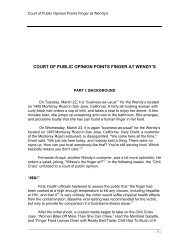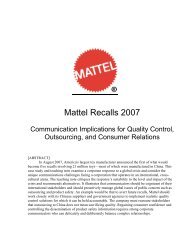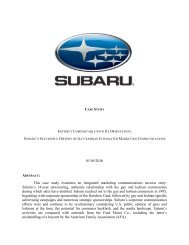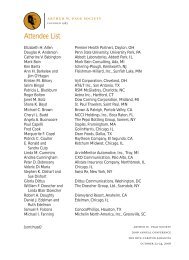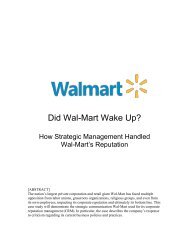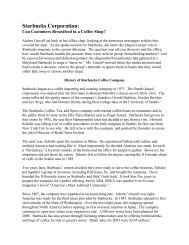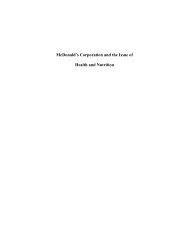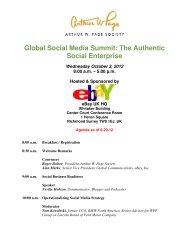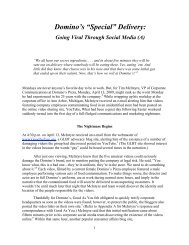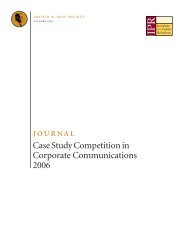Whole Foods/Wild Oats Merger: - The Arthur Page Society
Whole Foods/Wild Oats Merger: - The Arthur Page Society
Whole Foods/Wild Oats Merger: - The Arthur Page Society
You also want an ePaper? Increase the reach of your titles
YUMPU automatically turns print PDFs into web optimized ePapers that Google loves.
Appendix H: Time.com – July 19, 2007 ‡<br />
<strong>The</strong> Price of Anonymity<br />
By Lev Grossman<br />
Thursday, Jul. 19, 2007<br />
Over the course of eight or nine years, until last August, someone with the handle<br />
"rahodeb" posted regularly about the company <strong>Whole</strong> <strong>Foods</strong> on Yahoo!'s finance bulletin<br />
boards. Rahodeb liked <strong>Whole</strong> <strong>Foods</strong>. He didn't care for its competitor <strong>Wild</strong> <strong>Oats</strong>. Rahodeb<br />
particularly liked <strong>Whole</strong> <strong>Foods</strong> CEO John Mackey. "While I'm not a 'Mackey groupie,'"<br />
rahodeb wrote, "I do admire what the man has accomplished." This was true, as far as it<br />
went. Rahodeb was not a Mackey groupie. Rahodeb was Mackey.<br />
It was a venial sin that would never have come to light except that in February <strong>Whole</strong><br />
<strong>Foods</strong> made a $565 million play to buy <strong>Wild</strong> <strong>Oats</strong>‐‐the very company rahodeb so soundly<br />
dissed online‐‐and while reviewing the bid, the Federal Trade Commission (FTC) turned up<br />
what would, if this were a spy thriller, be known as the Rahodeb Identity. <strong>The</strong> FTC is<br />
seeking to halt the deal on basic antitrust grounds‐‐it claims that a union of the two<br />
companies would produce an organic‐foods quasi‐monopoly. <strong>The</strong> government may also be<br />
examining whether Mackey, in his double life, revealed information a CEO shouldn't. But<br />
there are plenty of economists and lawyers around to figure out important stuff like that.<br />
<strong>The</strong> really burning questions are, Why would Mackey bother posting about his own<br />
company on Yahoo? And should people be allowed to be anonymous on the Internet at all?<br />
As far back as the 1980s, the Internet has been an electronic masked ball, a place where<br />
people can play with new identities and get off on the frisson of being somebody else. MIT<br />
sociologist Sherry Turkle has argued that this kind of identity‐play even has therapeutic<br />
value. You certainly can't ascribe a plausible financial motive to Mackey‐‐rahodeb's<br />
postings weren't moving stock prices around. This was about just being naughty: picture<br />
Mackey chortling as he played the regular rube, like Marie Antoinette dressing up as a<br />
peasant and milking cows on the fake farm she built near Versailles. (Mackey was even in<br />
drag, sort of‐‐rahodeb is an anagram of his wife's name, Deborah.)<br />
But it's all fun and games till somebody loses his head. As anybody who has even looked<br />
sideways at the Internet knows, anonymity has a disastrously disinhibiting effect on human<br />
behavior. Freed of any possibility that their words will be connected to their actual<br />
identities, anonymous Internet posters have charted historic new depths of verbal<br />
offensiveness. Andrew Keen, author of <strong>The</strong> Cult of the Amateur: How Today's Internet Is<br />
‡ Passage from Grossman, L. (2007, July 19). <strong>The</strong> price of anonymity. Retrieved November 28, 2008, from Time<br />
Business & Tech Web site: http://www.time.com/time/magazine/article/0,9171,1645168,00.html<br />
33



